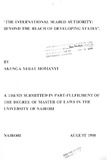| dc.description.abstract | This thesis argues that the deep seabed mining provisions and the International Seabed
Authority created under Part XI of the 1982 UN convention on the Law of the Sea are
beyond the reach of developing states because they lack capital and technology to
meaningfully venture into the seabed by themselves. Consequently the developing states may
not benefit from the exploration and exploitation of seabed resources.
Chapter One makes a general introduction and statement of the problem and traces the
historical evolution of the present legal regime for the seas. This chapter also justifies the
legal regime for the seas and finally makes an overview of the law of the sea convention)n.
In Chapter Two a study of the institutional framework of the Authority is undertaken. The
establishment and membership of the Authority, which is a creature of the Convention
constitutes the first part of the chapter. An important issue for discussion in this chapter is the
decision-making processes and the composition of the organs of the Authority. This proved
to be a major and controversial issue during negotiations in UNCLOS III. This principal
organs of the Authority, namely, the Assembly, the Council, the Secretariat and the
Enterprise are then discussed in turn. The other institutional aspects of the Authority are
summarised. The Preparatory Commission, which is the harbinger of the Authority is
discussed in the last part of this chapter.
Chapter Three defines and describes the Area and discusses the principles governing the
Area. The common heritage of humankind principle, perhaps the most important principle
governing the Area, is seen to be in jeopardy. The provisions of the Convention on transfer
of technology make unacceptable demands on the developed states. The princi ple of equitable
distribution of seabed resources is still an untried formula. An attempt is also made to discuss
the issue of development of the resources of the Area which is closely related to the issue of
principles governing the Area. In particular, the chapter discusses the problems and issues
emerging from the Convention's prescribed production policies and controls, and singles out
\
the controversial and prominent issue of "pioneer investments." There is also a discussion of
the so- called" Alternative Regimes."
xiv
Chapter Four discusses the developing states and international organisations generally, and
the Authority in particular. The controversies, conflicts and tensions that beleaguered the
construction of the deep seabed mining provisions in the Law of the Sea Convention are
demonstrative of the imbalances between the majority developing states and the minority
developed states in the pursuit of interests in the deep seabed. The pioneer investors and the
reciprocating states regimes considerably strengthen the position of developed states over the
developing states. An examination of the various national legislation and Agreements on
deep seabed mining (which collectively constitute the Reciprocating States Regime) leads to
the conclusion that this development would considerably hurt and bleed the Conventional
regime. Finally, a discussion of the United Nations General Assembly Agreement relating to
the implementation of Part XI of the UN Convention of the Law of Sea is undertaken. The
Agreement is perceived as an attempt at bridging the differences and healing the wounds
between those states, mainly developing states, which back the Conventional regime and
those ones, mainly developed states, which back the Reciprocating States' Regime.
Chapter Five summarizes the main points and makes recommendations and reflections on the
improvement of the deep seabed mining regime and the Authority, given that the Convention
has now entered into force as international law. | en |

